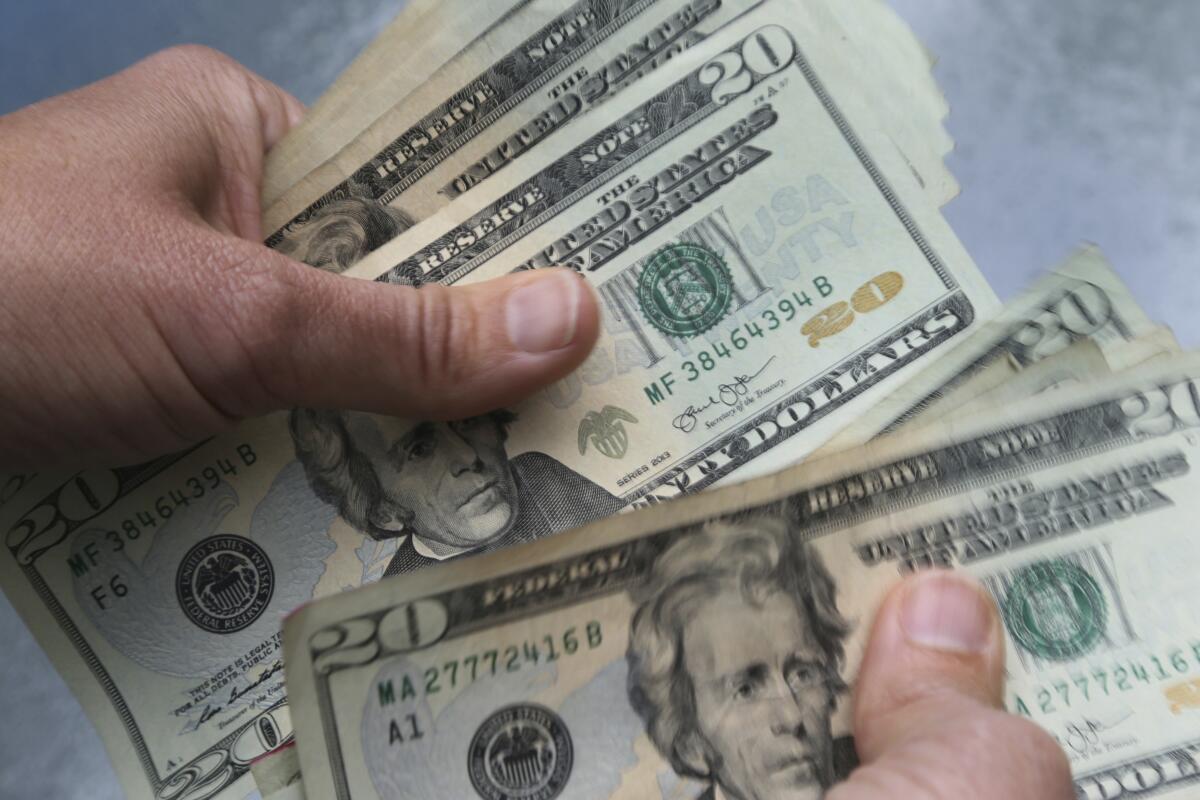It’s easy to squander a windfall. How to make the money work for you

- Share via
Dear Liz: I’m receiving a $150,000 inheritance soon. After I pay all of my debt, I’ll have approximately $70,000. I’m 51, single with no children and my net income is about $4,400 a month. I’ve rarely been wise or successful with my finances. I have no prior savings, don’t own a home and drive a five-year-old car. Do you have any thoughts for the remaining funds?
Answer: It’s never too late to get better with money. Now would be a great time to examine why you got into debt and what you need to change so that doesn’t happen again.
Windfalls tend to disappear pretty quickly, and it would be a shame if you found yourself back in debt in a few years with nothing to show for your inheritance.
Nonprofit credit counseling agencies affiliated with the National Foundation for Credit Counseling (www.nfcc.org) usually offer help with budgeting, or you could book some one-on-one sessions with an accredited financial counselor or accredited financial coach. You can get referrals from the Assn. for Financial Counseling & Planning Education at www.afcpe.org.
Paying off high-rate debt such as credit cards is a great use of a windfall. Think twice about paying off lower-rate debts such as student loans or car loans, however. You probably have better uses for that money.
You likely need to start saving aggressively for retirement.
If you have a 401(k) at work with a match, you should be taking full advantage of that. (You might draw from your inheritance to replace some of the money that’s being directed into your retirement account.)
Otherwise, you can put up to $7,000 into an IRA or Roth IRA — the usual limit is $6,000, but people 50 and older can make an additional $1,000 catch up contribution. You can dedicate even more money for retirement by opening a regular brokerage account and investing through that.
A windfall also can help you create an emergency fund equal to three to six months’ worth of expenses, as well as provide a starter savings account for your next car.
Resist the urge to replace the one you have, though, because with proper maintenance you should be able to drive the one you have for several more years. Buying new cars every few years is hugely expensive and generally unnecessary since today’s cars can easily drive without major problems for 200,000 miles or more, according to J.D. Power & Associates.
All investments involve risk
Dear Liz: I want to protect principal in my modest retirement savings account for future needs. I’ve been in cash and money market funds, but if the recent surge in inflation continues, purchasing power could decrease 25% or more over the next five years. Certificates of deposit and Treasury Inflation-Protected Securities (TIPS) tie money up for long periods and emergency use would result in significant loss. I’ve examined diversifying into real estate, commodities, foreign currencies, gold, but they all go up and down. Can principal be protected from loss and inflation?
Answer: No.
Investments that protect your principal typically have returns that trail inflation. Even though your principal is protected from one kind of loss, you’re all but guaranteed the loss of buying power over time. For inflation-beating returns, you need to take some risk.
Young people with decades until retirement should keep most of their retirement savings in stocks, but even those in retirement typically need to have some exposure to the stock market to preserve growth and buying power. A fee-only, fiduciary financial planner could give you individualized advice about how much risk is appropriate for you to take.
Mortgage payoff creates options
Dear Liz: My wife and I just paid off our mortgage. What’s the correct thing to do now with the amount we used for the mortgage payments?
Answer: Congratulations! Paying off a mortgage is a big deal, so consider using some of your freed-up money to celebrate in whatever way seems appropriate.
Many Americans don’t have adequate retirement or emergency savings, so those should be high priorities along with paying off any other debt you might have.
If you’re in good shape, though, consider boosting your charitable contributions. Studies show that generosity contributes to happiness, and spending money on others often makes us feel better than spending on ourselves.
Liz Weston, certified financial planner, is a personal finance columnist for NerdWallet. Questions may be sent to her at 3940 Laurel Canyon, No. 238, Studio City, CA 91604, or by using the “Contact” form at asklizweston.com.
More to Read
Inside the business of entertainment
The Wide Shot brings you news, analysis and insights on everything from streaming wars to production — and what it all means for the future.
You may occasionally receive promotional content from the Los Angeles Times.










